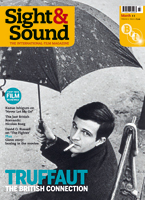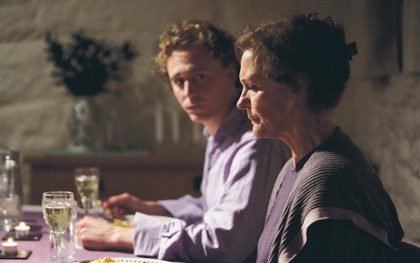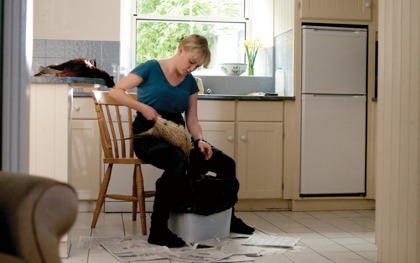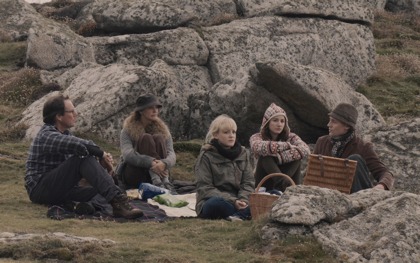Primary navigation


Following Unrelated with another tale of a tightly wound English family on holiday – this time in the Scilly Isles – Archipelago confirms Joanna Hogg as one of our subtlest and most probing filmmakers. By Jonathan Romney
This may not seem like headline news, exactly: the English upper middle class suffers from emotional repression and may harbour seething resentments beneath a patina of easygoing charm. But this is not the revelation of Archipelago so much as the underlying axiom on which Joanna Hogg builds her story about specific people in a specific setting. Like Hogg’s debut Unrelated (2007), Archipelago is essentially a chamber piece – albeit an outdoorsy one – minutely mapping the tensions and emotional evasions among a group of English people on holiday. Again, an outsider is caught in the squabbles of an enclosed family group. The setting – although it’s never named – is Tresco, one of the Scilly Isles, and the film is book-ended by the arrival and departure of a helicopter, linking the isle to the mainland. As much as a downbeat comedy of bourgeois mores, Archipelago is a sort of claustrophobic horror story, set in a place of no easy escape. This is Hogg’s Shutter Island, if you like, although the madness is more discreet, in the English style.
Another connection with Hogg’s earlier film is the repeat appearance of Tom Hiddleston, here playing the diametrical opposite of Unrelated’s bullish Oakley. His Edward is unassumingly pleasant, compassionate, idealistic – and irredeemably wet. Childlike throughout (he’s often seen lolloping boyishly in jumper and pyjamas), Edward emerges as an appeaser in the late scene where he tries to cheer up his sister Cynthia (Lydia Leonard), who has exercised emotional tyranny over her family throughout their stay. Poking his glove-puppeted hand round her bedroom door, he adopts the voice of a comedy animal: “Hello Mummy, I’ve been a bad, bad badger… Don’t worry, I’ll look after you.” Any viewer not actually retching at this point will be fascinated by the depth of familial perversity revealed here.
An archipelago is a group of islands such as the Scillies, or indeed a family – a set of individuals supposedly forming a unit yet separate from each other and, in this case, woefully unable to communicate. The mother, Patricia (Kate Fahy), never gets round to rebuking her absent husband until the end of the holiday, when she can only scream at him. Cynthia can barely express herself except through brittle signs of chagrin; with her monotone terseness (perfectly pitched by Leonard), she’s a mistress of emotional displacement, with a curious habit of venting her rage over poultry. She flies off the handle over buckshot in her pheasant, and in a superbly understated scene – which perfectly nails English unease about dining out – she sends back her underdone guinea fowl in a restaurant, showering contempt on her companions for not doing the same (her bird is, of course, cooked quite correctly).
As for Edward, there’s something no less neurotic in the way he lets himself be treated. It turns out that Chloe, his girlfriend of 18 months – whom he’ll only see briefly before leaving for Africa – has not been allowed to come to Tresco because this is strictly a family holiday. She’s not family, Cynthia objects: “It’s [sic] just someone you’re attracted to.” It’s horrifying that Edward has abjectly tolerated this treatment of himself, and of Chloe.

The enigmatic absence in the family is Will, apparently a cold, forbidding father (Edward lampoons him as a gruff, huntin’ shootin’ type) and a negligent husband. Echoing his absence is the gap on the living-room wall, from which the family has taken down a large, oppressive picture of a stormy sea, seen in close-up at the end of the film. The picture’s removal is a gesture of denial on the family’s part, repressing an image of conflict (even if it is a sound aesthetic choice).
There are two additional presences in the household – for both of which Hogg has cast non-professionals playing versions of themselves, thus breaking and loosening the tight frame of dramatic representation. One is real-life cook Amy Lloyd, whose Rose disturbs the family unit in terms of both emotion and class. Her servant status – although she’s possibly upper-middle-class herself – brings out the women’s insular snobbery. “You don’t have to make friends with the cook,” Cynthia hisses at Edward. “He’s got too much empathy,” Patricia ruefully comments.
Rose’s growing rapport with Edward suggests that she has adopted him as a surrogate kid brother – the sort who has to be comforted when lobsters are cooked. However, suggestions of sexual attraction are subtly pitched under the surface. Edward’s one act of displaced sexual activity is to serenade Rose with a pair of spoons – and perhaps one reason for Rose’s abrupt departure is that she despairs of him ever following up. The expected love story is another significant absence in the film, and the originality of Hogg’s story-telling is that narratives don’t come to fruition. Even blazing rows provide no catharsis – things just subside into the status quo.
The other outsider is the artist played by real-life painter Christopher Baker. He is a thoughtful, calming presence in the household, but there is one scene too many of him musing on life and painting. Christopher functions as the film’s resident aesthetic philosopher, his theory of painting loosely serving to articulate Hogg’s cinematic method. He preaches the value of chaos – which in fact Hogg’s filmic style, like her characters, rather tends to suppress. He believes in abstraction – and Hogg’s cinema is more concrete than abstract; but when he describes it as “a way of distilling and simplifying the important information”, that certainly chimes with Archipelago.

Indeed, Archipelago itself distils and simplifies the formal insights of the already spartan Unrelated. Hogg again favours long takes, precise editing, quasi-documentary recording of terse, tentatively casual dialogue patterns. But the visual textures are more distinctive than in Unrelated. Hogg and DP Ed Rutherford frame their characters – typically dressed in bland khaki and navy – in an equally downbeat natural palette, the house’s aquarium-like grey-green semi-darkness matching the tones of the surrounding country. This is a very distinctive landscape film – with its formal gardens and tropical foliage, Tresco looks almost dreamlike, half wild, half ornamental. But the HD-shot film is equally distinctive in its interiors, echoing the paintings of Danish artist Vilhelm Hammershøi. His muted, claustrophobic rooms provide models for images such as a shot of Edward at Patricia’s bedside, head turned three-quarters from the camera, daylight touching his neck – a concise picture of intimate desolation.
Like Hammershøi and Christopher, Hogg adheres to the credo of understatement, withdrawing what other films might deem essential – such as any backstory to explain Cynthia’s bitterness. Christopher teaches the principle of subtraction as he explains the internal dynamics of his paintings: remove the colour blue, he says, and the role of blue is transferred to the other colours. You could call Archipelago a study in universally displaced blue.
Viewers will differ on whether it’s daring or ill-advised of Hogg to visit similar territory twice. Between her two films, you lose something and you gain something. Some of Unrelated’s darker currents (notably of sexual menace) and some of the broader humour of social embarrassment are lost here. Archipelago’s sombre introspection may disappoint some of the earlier film’s fans, but it’s brave of Hogg to explore an austerely restricted version of similar themes in more nuanced depth; this is, if not more abstract, certainly a rather more cerebral film.
In any case, British filmmakers are often wary of repeating themselves, and it’s a bold move for Hogg to hold her corner, even at the risk of eventually painting herself into it. “I guess being tough is holding your course,” muses Christopher by way of avuncular advice to Edward. By that measure, Hogg – in her undemonstrative way – is one of the toughest filmmakers we have.
Joanna Hogg talks about how she found inspiration in painting on page 48 of the March 2011 issue of ‘Sight & Sound’
London Film Festival blog: Nick James talks to Hogg and Tom Hiddleston on LFF opening night (October 2010)
Geometry of feelings: Guido Bonsaver on Michelangelo Antonioni’s high-modernist cinema (July 2005)
Besieged reviewed by Sally Chatsworth (May 1999)